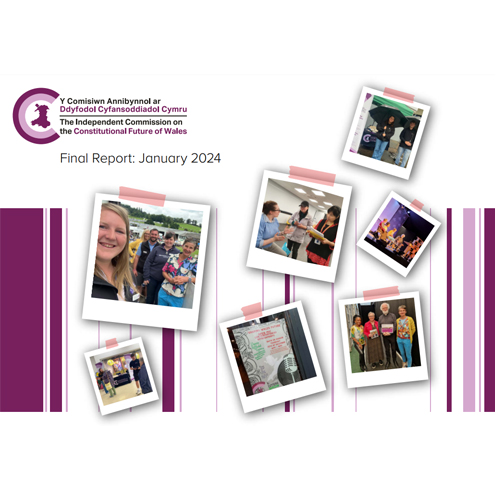The Second in a Series of Reflections on the Commission’s Report
This is the second in a series of blogs by members of the Governance and Human Rights Research Centre at Swansea University dealing with different aspects of the final report of the Independent Commission on the Constitutional Future of Wales.
The first in the series, by Dr Tom Hannant, provides an introduction to the Commission’s report. This blog focus discusses the report through the lens of human rights, with a focus on key themes of consistent interest to politicians and civil society in Wales.
Context
It is difficult to think of a policy issue where the fault lines between the Welsh Government and the UK Government are more pronounced than on human rights. These fault lines were highlighted recently when the UK Government sought to replace the Human Rights Act 1998 (‘1998 Act’) with a UK Bill of Rights. The 1998 Act embeds the European Convention on Human Rights (‘ECHR’) in UK law, and the current devolution settlement makes compliance with the ECHR a condition of legitimacy for the exercise of devolved functions (by Welsh Ministers and the Senedd).
Dubbed a Rights Removal Bill, if enacted the UK Government’s Bill would have undermined human rights protections across the UK. The Welsh Government, the Senedd and civil society in Wales united in its opposition to the proposal. The Welsh Government made clear its view that the ECHR is a ‘fundamental cornerstone of devolution’ and voiced concern that the UK Government had introduced its Bill without proper consideration of its impact on the ‘constitutional, legal and policy framework’ in Wales, which embraces human rights.
Senedd Cymru | Welsh Parliament
Other human rights issues (for example, asylum and migration, welfare reform and the rights of minorities) have all been recent points of contestation between the UK Government and the Welsh Government. And it is not just recently that differences between the two jurisdictions have become apparent. Since the outset of devolution, successive Welsh governments have sought to advance human rights through policy and legislation to embed international human rights in Welsh law and policy. This progressive agenda has seen Wales increasingly recognised as a champion of human rights amongst the four UK nations (along with Scotland).
Although the UK government shelved its Bill of Rights, the experience confirmed the Welsh Government’s resolve to further secure human rights protections through Welsh law. In 2021, Welsh Ministers commissioned research on options to Strengthen and Advance Equality and Human Rights in Wales (‘SAEHR’). Amongst the recommendations from this research is the introduction of a Welsh Human Rights Bill to incorporate international human rights directly into Welsh law. The Welsh Government accepted this recommendation and work is currently underway to examine options for legislation.
There is no doubt that human rights are a key policy concern in Wales. Welsh Ministers refer to human rights as the basis for government action in Wales, and engagements with civil society stakeholders during for the SAEHR research confirmed a strong desire for Wales to make independent progress on human rights through Welsh law.
This mood amongst civil society is reflected in the interim report of the Independent Commission on the Constitutional Future of Wales (the ‘Commission’) which notes that ‘non-political’ stakeholders identified ‘limitations on Wales’s ability to make progress on equalities and human rights’ as amongst the difficulties arising from the ‘jagged edge’ between devolved and reserved powers under the current devolution settlement. All of which would seem to suggest human rights ought to have been an area for closer attention by the Commission in its final report.
What, no Human Rights?
In its final report, the Commission discusses the scope to broaden the settlement in areas where the boundaries of devolution are a matter of ‘live debate’. Everything discussed in this blog so far, including the Commission’s interim report, suggests that competence and responsibility for human rights are a matter of ongoing and live debate in Wales. It is therefore surprising that the Commission’s final report is silent on human rights preferring instead the terminology of ‘citizen’s rights’ and ‘constitutional rights’, as well ‘equality and inclusion rights’. These terms are not explained, although the Commission does suggest that an ‘independent Wales’ would likely ‘sign up’ to ‘international conventions’ which set out ‘equality and inclusion rights’, and that constitutional rights would inform a ‘constitution building’ process should Wales become independent. While not confirmed, the international conventions which the Commission alludes to are most likely the ECHR (mentioned by the Commission) as well as the core international human rights conventions (as several focus on equality and inclusion).
The Commission is of course correct to suggest that constitutional rights would be to the fore in constitutional arrangements in the event of an independent Wales. However, the implication of the Commission’s analysis is that questions around compliance with international human rights conventions would only become relevant to the constitutional future of Wales, should Wales gain independence: this is misplaced. As is the suggestion that rights (equality and inclusion rights is the term used) could only be ‘entrenched’ under a federal system, or ‘embedded’ where there is independence. The Commission seems to have decided not to highlight the fact that Wales has already incorporated (entrenched or embedded) two international conventions (on children's rights and disabled people’s rights) and a set of UN human rights principles (on older people) into Welsh law under the existing devolution settlement.
The decision not to include discussion of what Wales has achieved and what it might accomplish on human rights is unfortunate, as it limits the Commission’s vision on reform. In particular, it has removed from consideration the potential for human rights to strengthen democracy and improve people’s lives under an enhanced settlement, where Wales has greater control over law and policy levers which influence human rights (e.g. welfare benefits, taxation, policing, equality, asylum and the justice system). The Commission’s approach is difficult to fathom as it has noted developments which hint at the potential for a more progressive approach to key policy issues should Welsh institutions gain more extensive powers over human rights. In a passage which discuss ‘citizenship and rights’ (of access to services), the Commission comments that the Welsh Government has taken a ‘different approach within some policy areas’. While this is well-short of acknowledging the leadership that Wales has demonstrated on human rights, it does suggest some peripheral awareness of relevant developments in this space.
This Commission’s lack of direct attention to human rights is all the more difficult to understand as its final report acknowledges the important work of the Thomas Commission in 2019 (Commission on Justice in Wales). The Thomas Commission concluded that Wales has introduced ‘far sighted policies…on international standards on human rights’ and has ‘incorporated international principles of human rights’ into Welsh law. It may be thought, entirely reasonably, that this ought to have alerted the Commission to the importance of human rights to not only the current, but also any future devolution (re)settlement.
A Missed Opportunity
My colleague Tom Hannant, in the first in this series suggested that perhaps the most notable aim of the Commission’s report is to promote a ‘national conversation’ about the future of Welsh devolution. If this is the case, then I fear taking a lead from the Commission risks excluding human rights from the conversation (unless the discussion is about an independent Wales).
For those interested in human rights in Wales the Commission’s report is a missed opportunity, not least because human rights are internationally recognised as providing a framework for good governance and as a guide for constitutional arrangements (including under current devolution settlements in the UK). A different approach could have seen human rights examined as constitutional pillars with the potential to underpin delivery of decent services in areas such as health, housing, education etc, by placing obligations directly on government to achieve specific rights-based objectives.
As Tom comments in his blog, the Commission’s report offers few ‘concrete policy recommendations for proponents of reform to Welsh devolution to rally around’. What a shame then that the Commission passed up the opportunity to connect to and amplify the Thomas Commission findings and SAEHR recommendations on human rights; perhaps by echoing the call for a Welsh Human Rights Act as a discrete constitutional framework for governance in Wales.
Simon Hoffman is Professor of Human Rights at the School of Law, Swansea University.




